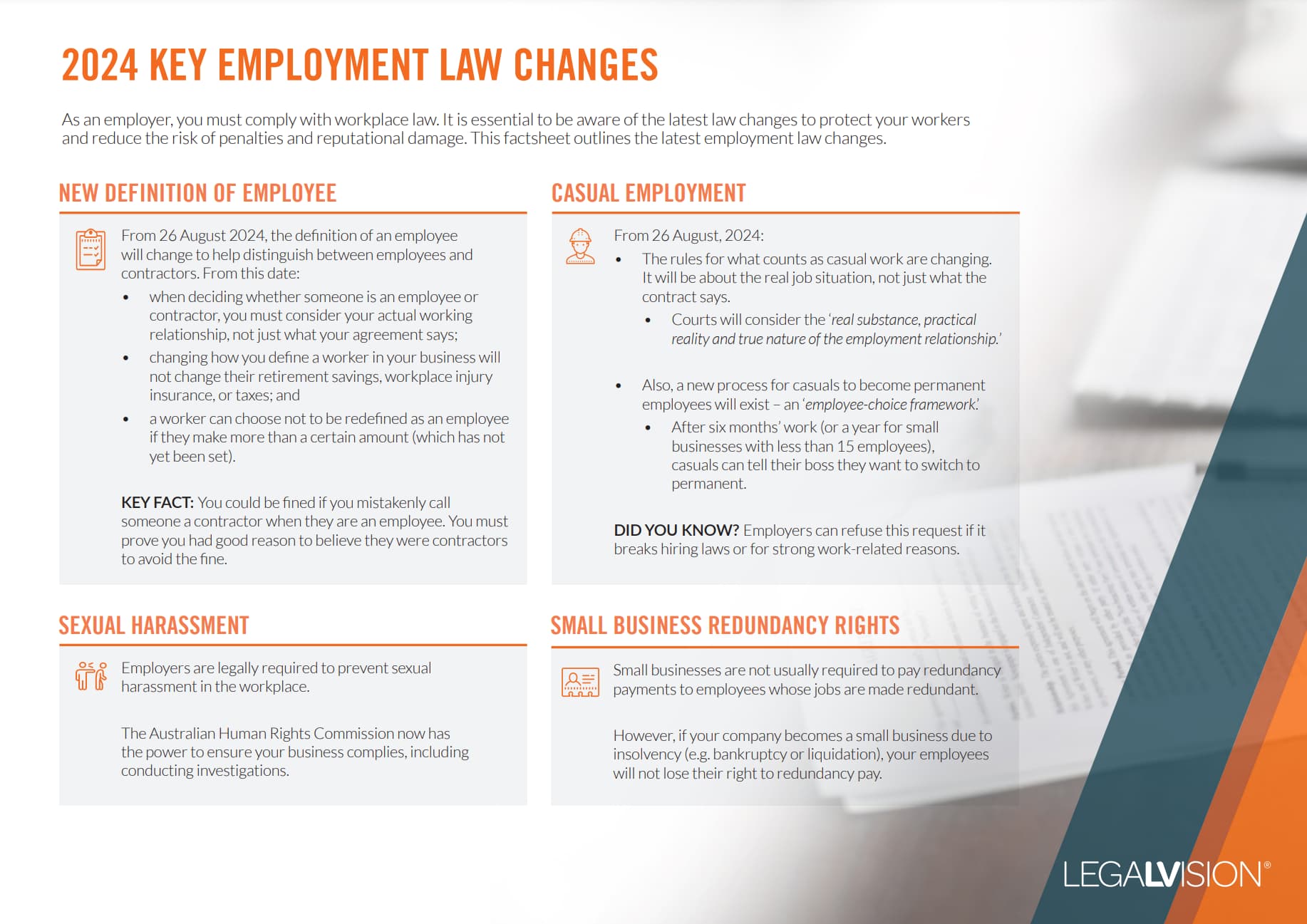In Short
- Medical assessment clauses can help ensure employees are fit for the role but are not legally required.
- You must ensure any assessments are relevant and comply with anti-discrimination laws.
- Always consider reasonable adjustments for employees with medical conditions or disabilities.
Tips for Businesses
Before including a medical assessment clause, assess whether it is necessary for the role. Avoid discrimination by ensuring it is only used for relevant roles and considering any reasonable adjustments. Seek legal advice to ensure compliance with discrimination laws and safeguard your business from potential claims.
When hiring new employees, you want to ensure you bring on board individuals who are physically and mentally capable of performing the required duties of the role. One way to address this is by including a medical assessment clause in the employment agreement.
However, you should be aware that including these clauses in your employment agreements may pose a risk to your business regarding potential discrimination claims. There is no express provision relating to the inclusion of medical assessment clauses in employment agreements in the Fair Work Act 2009 (the Act). However, this article will outline some key points you should consider when considering including them.
Should I Include a Medical Assessment Clause?
While it is not a legal requirement, you should ideally look to include medical assessment clauses in your employment agreements. It is important to remember that the existence of these clauses does not mean that all employees are required to have a medical assessment. Rather, you can exercise discretion when deciding whether to enforce the clause.
Furthermore, even if you choose not to include a medical assessment clause, you can still require an employee to attend a medical examination if the direction is lawful and reasonable. When determining whether the direction is lawful and reasonable, there are several factors to consider, expanded on below.

As an employer, it is essential to understand what employment laws have changed and their implications for your business — particularly the changes to the Fair Work Act 2009 through the new Closing the Loopholes legislation.
Discrimination Considerations
You are entitled to ensure that your employees are ready, willing and able to perform the inherent requirements of their roles. Additionally, you have a duty to ensure that employees can perform their roles safely. However, deciding whether an employee is fit for a role due to a medical condition may give rise to discrimination.
Furthermore, if you are put on express notice that a potential employee has a disability, and you choose not to hire them for another unrelated reason, this may still present an increased risk of discrimination claims.
As such, you must carefully consider whether any medical assessment requirements are:
- truly necessary; and
- directly related to the inherent requirements of the position.
Additionally, clauses may be drafted in a way that simply outlines that employees warrant they can perform the role without disclosing their personal medical status.
Continue reading this article below the formHigh-Risk Industries
In mining, construction or transportation industries, where roles involve significant health and safety risks, you may require pre-employment medical assessments to ensure candidates are physically and mentally fit to perform their duties without posing undue risks.
Similarly, drivers in the transportation industry may need to undergo periodic medical assessments to ensure they meet the necessary physical and cognitive standards for safely operating vehicles.
Roles with Specific Medical Requirements
There are also job roles where specific medical requirements or standards must be met, justifying including a medical assessment clause. For instance, roles in the healthcare industry may require employees to meet certain physical and mental health standards, including:
- nurses;
- doctors; or
- paramedics.
In these situations, you might include this clause to ensure that candidates meet medical requirements before being offered the position.
Best Practices for Employers
To navigate the complexities surrounding medical assessment clauses in employment contracts, consider the following best practices:
- Conduct a Thorough Job Analysis: Before requiring medical assessments, carefully consider the inherent requirements of the job to determine whether specific medical standards are genuinely necessary.
- Maintain Confidentiality: Any medical information obtained through assessments should be treated with strict confidentiality. You should use this information solely to determine employment suitability.
- Consider reasonable adjustments: If a candidate or employee has a disability or medical condition, consider reasonable accommodations. These should enable them to perform the job’s essential functions safely and effectively.
Key Takeaways
There is no legal requirement to include a medical assessment clause in employment contracts. However, this may assist you in ensuring that employees are fit and able to perform their roles. You must strike a balance between ensuring the health and safety of employees and avoiding discrimination against individuals with disabilities.
If you need help drafting a medical assessment clause, our experienced employment lawyers can assist as part of our LegalVision membership. For a low monthly fee, you will have unlimited access to lawyers to answer your questions and draft and review your documents. Call us today on 1300 544 755 or visit our membership page.
Frequently Asked Questions
No, it is not required by law. However, it can help ensure employees are fit for the role as long as it is relevant to the job. Additionally, you must comply with anti-discrimination laws.
You should assess if the medical assessment is necessary for the role. Additionally, ensure it does not discriminate against employees with disabilities and consider if any reasonable adjustments can be made.
We appreciate your feedback – your submission has been successfully received.












